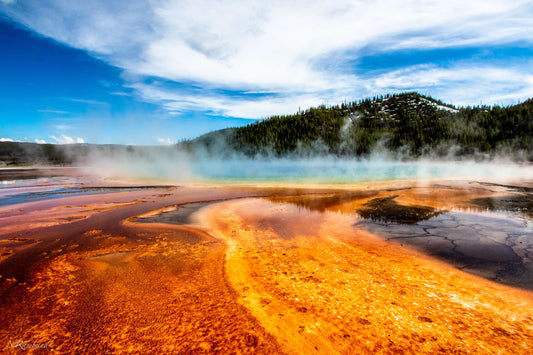It is easy to overlook the importance of hydration which is surprising considering 60 to 70% of the human body consists of water. Water regulates our body temperature, aids digestion, lubricates our joints, and helps remove waste among many other critical functions. This is true whether you're an elite athlete logging thousands of training miles annually, or a casual rider who rides for fitness and fun.
You need to hydrate, even when riding an eBike
Studies show that eBike owners actually log more riding hours than riders on traditional bikes - probably because they're more willing to ride for longer trips when they have an eBike to help with hills or headwinds. More time in the saddle means proper hydration becomes increasingly important.
Proper hydration during the day can help maintain good energy levels and improve concentration at work. Proper hydration during bike rides can help the body cool effectively and minimize the risk of muscle cramps, especially as you increase ride distance and riding time.
You may wonder:
- What should I be drinking during my bike rides?
- Is plain water sufficient?
- What about electrolytes like salt?
- Do I need sugar if I am just going for a cruise and I am not an elite athlete?
Water, carbohydrates, and electrolytes during bicycle rides
If you are going for an easy to moderate spin (a low-intensity ride that isn't strenuous) under 2 hours long and it is not really hot out, just drinking water is fine. However, if it is hot out consider choosing something with salt and ideally a little sugar. You don’t need a ton of sugar, but some is ideal for optimal hydration.
Two lower sugar examples are Liquid IV and Flow Formulas Electrolyte Replacement Mix. Both of these products contain more salt than most sports drinks so start with less than a serving, about a third or half. Mix the powder in with water.
If you prefer drinking plain water and the temperature out is high, pack some salty snacks like pretzels, trail mix, popcorn, crackers, or beef jerky. If you find you get sweat stains on your clothing or get salty skin that means you are a salty sweater and should consume a little more salt during rides.
If you are riding over 2 hours and at a vigorous pace, consider using a sports drink so that you are consuming more carbohydrates. This will help ensure you are fueled and energized during the duration of your ride. Examples of sports drinks with carbohydrates are Gatorade or Skratch Labs. However, you don’t have to drink those carbohydrates, you can eat snacks throughout your ride to ensure you are consuming enough. In addition to salty snacks, you can also eat bananas, oranges, apples, and fig bar, and peanut butter and jelly sandwiches cut up into small squares. However, you only need to be concerned about consuming a sports drink or eating snacks for the harder endurance rides.
Keep in mind if you have hypertension, or high blood pressure, experts recommend limiting daily consumption of sodium to just 1,300 mg. If you have high blood pressure, talk to your doctor to determine if adding salt into your bike ride hydration plan is a good idea for you.
Overhydration risks and symptoms
Can you overdo it? Yes! You can drink too much water, especially plain water. You can become hyponatremic, a condition that occurs when the level of sodium in the blood is too low. Your body holds onto more water and you may appear edematous, or swollen.
Symptoms of hyponatremia are:
- nausea
- fatigue
- confusion
To properly hydrate, sip water throughout the day, have a water bottle around as a reminder, and still drink on your bike rides, but don’t force it. Don’t drink large amounts of water to hide hunger.
Urine color can be a good indicator of hydration status. Clear means overhydration. Pale yellow to yellow is ideal. An amber or dark yellow color urine indicates you need to drink water immediately! If you are sweating a lot, it’s really hot out, or you just completed an intense ride, add a little salt to your food or eat a salty snack like tortilla chips, pretzels, salted nuts, pickles, popcorn, beef jerky or fruit with salt on it.
Signs of dehydration
How can you tell if you are dehydrated? Symptoms of dehydration include:
- dark urine
- low volume of urine
- dizziness
- lightheadedness
- increased thirst
- fatigue
- headaches
Dehydration can be caused by simply forgetting to drink water, being in hot temperatures either during exercise or during the day, and illness. If you work in profession where you are exposed to high temperatures such as landscapers, gardeners, constructions workers, food service employees or work in a warehouse you are at a higher risk of dehydration. I would consider sipping on a drink like Liquid IV or Flow Formulas Electrolyte Hydration mix during the day.
Ever get headaches after a long day at work? While it could be due to time spent at a computer or lack of sleep, think back to how much water you drank that day. I always recommend taking a water bottle anytime you go somewhere to have it to sip on.
Flavored water can encourage hydration
If you forget to drink water or don’t like the taste, add lemon, lime, or other flavorings. Seltzer water, unsweetened herbal tea, and hot tea are also great options. Keep in mind that drinking alcohol can dehydrate you because it acts as a diuretic. As you age you are also at a greater risk of dehydration. Older adults have less water in their bodies and have a deceased thirst sensation. Furthermore, it takes longer to replace body fluids and recover from dehydration as you age.
Emily’s pro tip:
Feeling dehydrated after spending all day out in the sun? My favorite summer snack is watermelon with a little salt on it. However, in addition to their many vitamins and minerals, many fruits and veggies are great for hydration because of their water content. In particular, watermelon, strawberries, oranges, peaches, cantaloupe, celery, and cucumbers have a higher water content.
Background
Regular exercise helps improve health, can reduce your risk of heart disease, and can strengthen your bones and muscles. You should talk to your doctor before changing your exercise or nutrition program.
Emily is a Registered Dietitian Nutritionist (RDN) who specializes in Sports Nutrition. She strives to help athletes of any level fuel for optimal performance and health. For more about Emily and to learn more about nutrition for a healthy and active lifestyle, visit https://emilywernersportsnutrition.com.




